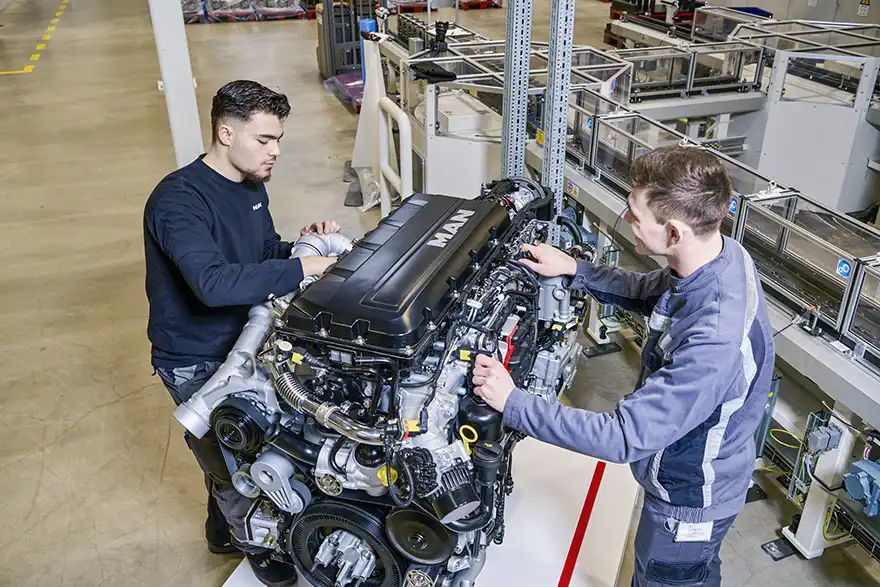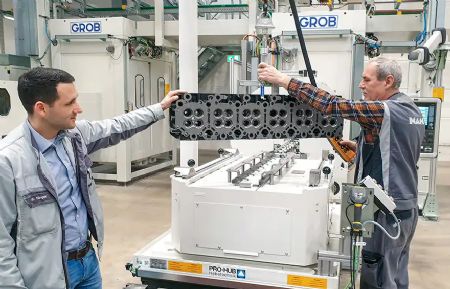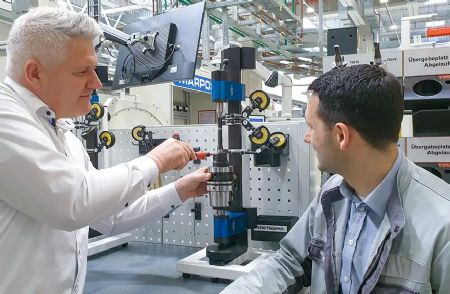 The ultra-efficient new 13-litre diesel engine MAN D30 is expected to be the last generation of the diesel engine from Nuremberg. Battery production has begun at the Nuremberg site at the same time. Photo: MAN
The ultra-efficient new 13-litre diesel engine MAN D30 is expected to be the last generation of the diesel engine from Nuremberg. Battery production has begun at the Nuremberg site at the same time. Photo: MANProduction of
MAN Truck & Bus’s new ultra-efficient 13-litre diesel engine is now underway at the company’s Nuremberg plant. Designed as a joint engine platform for the
Traton Group, the D30 engine will be deployed across multiple brands including Scania, Volkswagen Truck & Bus and International Motors. Fine boring tools from
Mapal are being used to machine the valve guide and valve seat blind bores in the cylinder heads.
The launch of diesel engine production coincides with another major development at the site — the start of battery series production for MAN’s electric vehicles. The new battery facility, housed in the tallest production building on the site at over 35m high, is equipped with more than 50 assembly stations and is expected to produce up to 50,000 high-voltage batteries annually, with capacity set to double by 2030.
Directly opposite the battery hall, diesel engine production spans 23,000m
2. Marco Singer, process planner at MAN, is overseeing cylinder head production for the newly developed D30 engine. Commenting on the shift toward electrification, Mr Singer said: “The electric motor is the ideal drive for a wide range of applications, such as city traffic. In other areas, however, diesel will continue to exist for a long time to come.”
He cited agriculture, naval operations and defence as sectors where diesel remains indispensable, adding that a mix of drive technologies will be necessary going forward. The D30 engine is built on a modular platform and offered in six performance levels ranging from 360 to 560hp. It replaces the D26 and D15 series and is aimed primarily at 40-tonne trucks.
 Pictured right: for process planner Marco Singer (left) the cylinder head with its 6 cylinders and 24 valves is the head of the engine. Photo: Mapal
Pictured right: for process planner Marco Singer (left) the cylinder head with its 6 cylinders and 24 valves is the head of the engine. Photo: MapalWith a maximum efficiency of 50% and a 5% reduction in fuel consumption compared to its predecessors, the engine also delivers a corresponding cut in CO
2 emissions. MAN has invested around 220 million euros in the project, which will eventually employ up to 160 skilled workers in three-shift operation. Initial production is starting with a single shift, with output determined by market demand.
Mr Singer explained: “Whether this is used to its full potential is ultimately decided by the customers.” Mapal’s involvement in the D30 project builds on a decades-long partnership with MAN. The Aalen-based tooling specialist was awarded the contract for fine machining of the valve guide and valve seat bores following a recommendation from
Grob, the machinery manufacturer responsible for the complete process and tool design. Each of the engine’s six cylinders features two inlet and two outlet valves, requiring 24 bores per cylinder head. These are machined on a double-spindle machine integrated into a linked system with Grob machines, loaded via linear gantries.
A reliable, economical processInitially, another toolmaker was tasked with fine machining, but MAN ultimately opted to rely fully on Mapal after encountering stability and cost-efficiency issues. Mapal’s proven fine machining system, already in use across multiple machines at the plant, was further refined in collaboration with MAN.
Mr Singer continued: “The machining changed fundamentally. For instance, we saved a semi-cut and were able to do without pilot friction. Instead, we simply moved to our pre-machined diameters with the indexable insert tool, ensured a good bore entrance for the reamer, and then ultimately reamed through once.” The result was a reliable, economical process that met the 5min cycle time for valve seat and guide machining, despite tighter quality requirements.
Markus Meyer, technical consultant at Mapal, highlighted the precision involved: tolerances for the valve and valve seat blind bores are less than 20µm, with a tolerance of approximately 50µm from seat to guide. No offset is permitted between the valve seat and guide, as this could cause shear forces. Surface finishes must meet an Rz of less than 20µm. The cylinder head bank is made from GJV 450 cast iron, with wear-resistant materials pressed in as rings and guides.
 Pictured left: Thomas Teuber, product and application management fine boring at Mapal (left), configures a fine machining tool for the valve seat blind bore together with Marco Singer, process planner at MAN.
Pictured left: Thomas Teuber, product and application management fine boring at Mapal (left), configures a fine machining tool for the valve seat blind bore together with Marco Singer, process planner at MAN.Further improvements were achieved through joint workshops focused on reducing unit costs before series production. Tool handling was simplified to reduce configuration time and ease operator workload. Mapal introduced its EA (EasyAdjust) system for the valve seat tool, integrating the back taper into the cassette and eliminating the need to set it manually. Thomas Teuber, head of product and application management fineboring at Mapal, explained: “The operator no longer needs to keep an eye on two dial gauges. They can focus on just one dial gauge, which they can use to adjust the insert’s protrusion compared to the guide pads. — that is much faster.”
The EA system also features TEC indexable inserts with four cutting edges — double that of conventional Mapal reaming inserts. Enhanced cutting materials and coatings further improve tool life and process reliability. These changes led to a 40% reduction in machining costs for valve seat and guide operations. Mr Singer concluded: “I am very happy with the milestone that has been achieved,” praising the collaboration with Mapal and reaffirming his commitment to continuous process improvement.
The assumption at MAN is that the D30 will be the company’s last entirely newly developed diesel commercial vehicle engine — after more than 100 years of diesel engine construction at the Nuremberg site. As of 2030, every second vehicle delivered to customers is expected to have an emissions-free drivetrain.